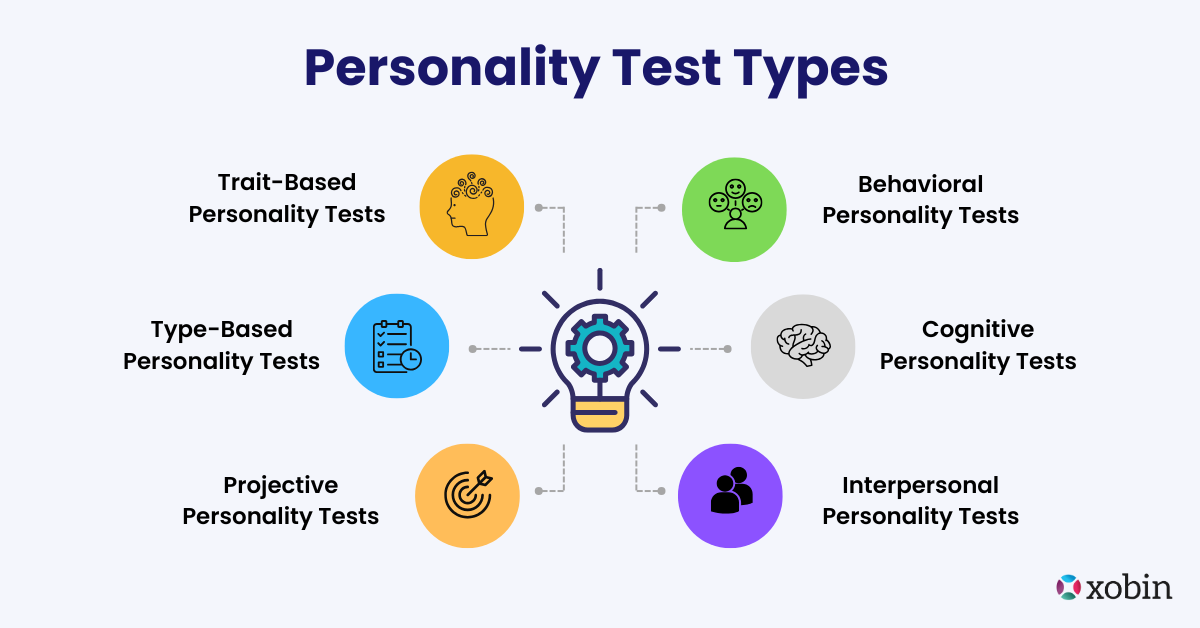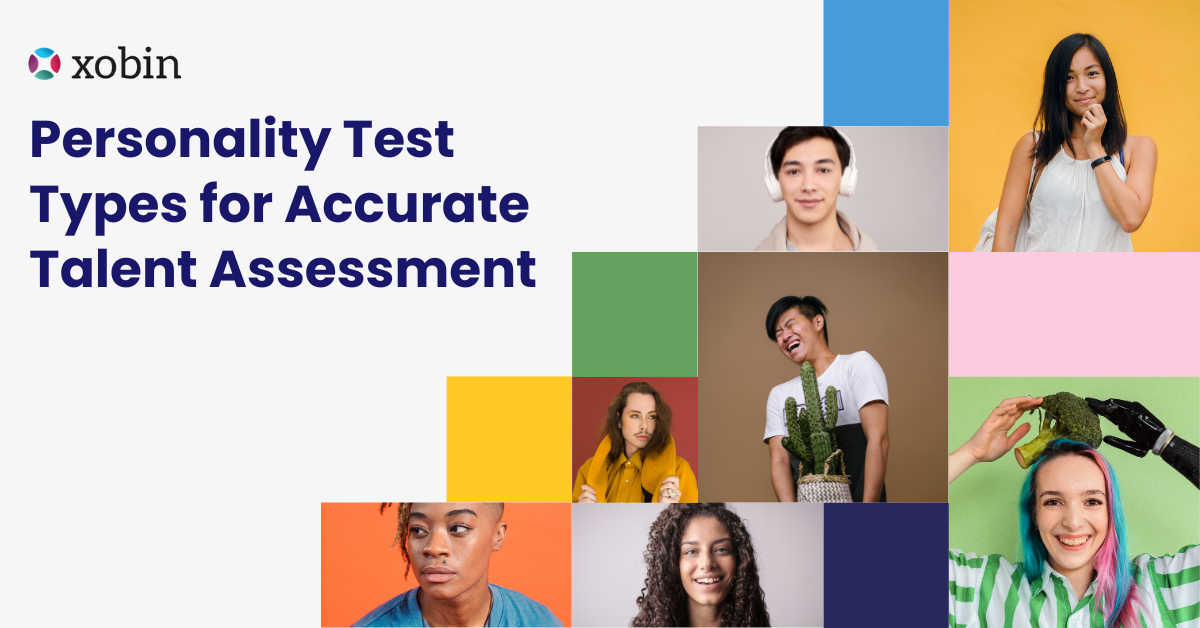When it comes to hiring the best talent, one of the most valuable tools recruiters have is personality evaluation testing. Understanding a candidate’s personality traits, behavioral tendencies, and cognitive strengths provides deeper insights into how they might perform in a role. Choosing the right test among thousands of personality test types is essential for identifying individuals who align with your company’s culture and objectives. With Xobin’s Psychometric Testing Software, recruiters can make informed, data-driven hiring decisions with ease. Now, let’s explore the different types of personality assessment tests and how they enhance recruitment accuracy!
Table of Contents
Different Personality Test Types

1. Trait-Based Personality Tests
Trait-based personality tests are designed to evaluate specific characteristics that make up an individual’s personality. These traits are generally stable over time and influence how people respond to various situations. Employers can gain valuable insights into a candidate’s behavior, preferences, and compatibility with job roles by assessing these traits.
- Big Five Personality Test (Five-Factor Model): One of the most well-known and scientifically backed models, the Big Five Personality Test assesses individuals across five broad dimensions: Openness, Conscientiousness, Extraversion, Agreeableness, and Neuroticism (OCEAN). This test measures how individuals differ in these areas and is frequently used in both research and employment settings to predict behavior and job performance.
- 16 Personality Type Test (16PF): Developed by Raymond Cattell, the 16PF assesses 16 primary personality traits. It is widely utilized in organizational contexts to predict how individuals might behave in various scenarios. This comprehensive test provides a detailed understanding of a person’s personality, which can be highly beneficial for making informed recruitment decisions.
Trait-based personality tests are the most commonly used personality assessments in recruitment. These tests assess specific personality traits such as extroversion, conscientiousness, openness to experience, agreeableness, and emotional stability. They are based on the Big Five Personality Traits model, which is widely regarded as the most scientifically valid framework for understanding personality.
How They Work:
Trait-based tests measure the degree to which a candidate exhibits certain traits. For example, someone who scores highly in conscientiousness may be detail-oriented, responsible, and reliable, making them a good fit for roles that require attention to detail. On the other hand, someone with a high openness to experience might thrive in creative or innovative environments where problem-solving and adaptability are key.
Why They’re Important:
These tests are invaluable because they give recruiters a clear picture of a candidate’s personality and behavior in various situations. By assessing core traits, recruiters can predict how candidates will handle different work environments and job requirements. It helps employers identify individuals who are more likely to excel in specific roles.
Benefits for Recruitment:
- Predicts job performance based on personality traits.
- Helps determine cultural fit within the company.
- Can identify strengths and weaknesses to match candidates to the right role.
2. Type-Based Personality Tests
Type-based personality tests categorize people into distinct types or categories, helping individuals understand how their personality fits into a broader framework. Unlike trait-based tests, type-based tests focus on specific groups of characteristics.
- Myers-Briggs Type Indicator (MBTI): One of the most popular personality assessments, the MBTI divides people into 16 different personality types based on four dichotomies: Extraversion (E) vs. Introversion (I), Sensing (S) vs. Intuition (N), Thinking (T) vs. Feeling (F), and Judging (J) vs. Perceiving (P). Each individual is classified into one of the 16 types, such as ENFP or ISTJ.
- Enneagram of Personality: The Enneagram divides personality into nine types, each representing a core motivation and emotional drive. Each type has unique strengths, weaknesses, and coping strategies, helping individuals understand their intrinsic motivations and personal challenges.
Type-based personality tests focus on categorizing individuals into specific personality profile types. Unlike trait-based tests, which measure continuous traits on a scale, type-based tests group people into distinct types. The Myers-Briggs Type Indicator (MBTI) is one of the most popular type-based assessments, categorizing individuals into 16 personality types based on their preferences for four dimensions: introversion vs. extraversion, intuition vs. sensing, thinking vs. feeling, and judging vs. perceiving.
How They Work:
The MBTI, for example, assigns a person a four-letter code, such as INTJ (Introversion, Intuition, Thinking, Judging), which represents their personality profile types. Each type describes how a person typically reacts to situations, makes decisions, and interacts with others. Type-based tests offer a structured and simple way to understand the complexity of human personalities.
Why They’re Important:
These personality test types provide a clear and easy-to-understand framework for evaluating candidates’ personalities. Knowing a candidate’s personality type can help recruiters determine if their approach to work, decision-making, and interaction with others aligns with the team dynamics or role requirements.
Benefits for Recruitment:
- Easy-to-understand categorization.
- Helps recruiters match candidates with specific roles and teams.
- Aids in identifying potential for leadership or teamwork.
3. Projective Personality Tests
Projective tests are based on the belief that people project their inner thoughts, feelings, and desires onto ambiguous stimuli, such as images or words. These tests aim to explore the unconscious mind, offering valuable insights into an individual’s underlying psychological processes.
- Rorschach Inkblot Test: This test asks the subject to explain what they perceive in a sequence of inkblot pictures. After that, the answers are examined to uncover underlying conflict, feelings, and mental patterns.
- Thematic Apperception Test (TAT): In this test, individuals are shown ambiguous images and asked to create a story based on them. The stories people come up with are believed to reveal insights into their subconscious feelings and motives.
These personality test types are a bit different from trait-based or type-based assessments. These tests aim to uncover hidden aspects of an individual’s personality by prompting responses to ambiguous stimuli, such as pictures or abstract shapes. A prominent example of this type of test is the Rorschach Inkblot Test, in which participants interpret inkblots to reveal deeper insights into their psychological state.
How They Work:
Projective tests rely on the idea that individuals will project their feelings, thoughts, and emotions onto the ambiguous stimuli. For instance, a person’s interpretation of a vague image might reveal how they feel about authority, stress, or relationships. This method uncovers deep, subconscious layers of a candidate’s personality.
Why They’re Important:
These personality test types may be less common in recruitment, but they offer valuable insights into how candidates respond under pressure and manage ambiguity. Typically used in clinical settings, these tests can also play a crucial role in recruitment. They are particularly beneficial for positions that demand emotional intelligence or the ability to handle stressful situations effectively. By assessing these traits, employers gain a deeper understanding of a candidate’s true capabilities.
Benefits for Recruitment:
- Offers deep insights into unconscious motivations and behaviors.
- Can assess emotional intelligence and coping mechanisms.
- Helps predict how candidates might perform under stress.
4. Behavioral Personality Tests
Behavioral personality tests focus on how individuals behave in different situations. They often involve observing responses to specific scenarios or measuring behavior in real-time, making them highly relevant for understanding how people interact with others or perform tasks in daily life.
- Situational Judgment Tests (SJTs): These tests present hypothetical, work-related situations, and individuals are asked to choose the best course of action. SJTs are often used in recruitment and can help determine how someone might react in a variety of professional scenarios.
- Workplace Personality Inventory: This type of test evaluates behaviors relevant to specific job functions, such as leadership style, work ethic, or communication preferences.
These tests focus on how candidates have acted in the past and use that information to predict how they will behave in the future. This approach relies on the belief that evaluating past behavior provides the most accurate prediction of future performance.
How They Work:
Behavioral tests present candidates with hypothetical scenarios or past situations that require a response. For example, a candidate may be asked how they would handle a difficult coworker or a tight deadline. Their responses reveal patterns in their behavior, such as problem-solving skills, teamwork, or conflict resolution.
Why They’re Important:
These tests are essential for assessing how candidates have responded to challenges in the past and can help recruiters predict future behavior in the workplace. Behavioral assessments offer concrete insights into a candidate’s problem-solving skills, leadership potential, and interpersonal skills.
Benefits for Recruitment:
- Provides a realistic view of how candidates might perform in specific situations.
- Predicts behavior in real-world scenarios.
- Helps recruiters evaluate power skills like communication and leadership.
5. Cognitive Personality Tests
Cognitive personality tests assess how individuals process information and how their cognitive processes influence their behavior and interactions. These tests focus on intellectual abilities, decision-making styles, and problem-solving skills.
- Cognitive Reflection Test (CRT): The CRT measures an individual’s ability to override impulsive responses and engage in deeper, more reflective thinking. This test assesses cognitive biases and decision-making strategies.
- Raven’s Progressive Matrices: This non-verbal test evaluates fluid intelligence, or the ability to solve novel problems, by asking individuals to identify patterns in visual stimuli.
Cognitive personality tests evaluate a person’s intellectual abilities, including memory, reasoning, problem-solving, and decision-making skills. These tests measure cognitive functions, focusing on how candidates process information. Intelligence and aptitude tests are common examples of cognitive assessments.
How They Work:
Cognitive tests typically involve tasks that assess logical thinking, numerical reasoning, and abstract problem-solving. Candidates often solve puzzles or respond to questions that challenge their critical thinking abilities. These tests measure how well a person can absorb information, think quickly, and make decisions.
Why They’re Important:
Cognitive personality tests are crucial for roles that require analytical thinking, complex decision-making, or high-level problem-solving. By assessing cognitive abilities, recruiters can determine whether a candidate has the intellectual capabilities to thrive in a particular role or industry.
Benefits for Recruitment:
- Helps assess critical thinking and problem-solving abilities.
- Useful for technical or high-level positions requiring intellectual capabilities.
- Helps identify candidates who can adapt and learn quickly.
6. Interpersonal Personality Tests
Interpersonal personality tests assess how individuals relate to others, including how they communicate, build relationships, and interact in social settings. These tests can be especially valuable for understanding leadership qualities, teamwork, and communication styles.
- Social Styles Inventory: This test evaluates an individual’s social style based on assertiveness and responsiveness. It categorizes individuals into four main styles: Driver, Expressive, Amiable, and Analytical.
- Interpersonal Reactivity Index (IRI): The IRI measures empathy, or how people respond emotionally to others. It evaluates both emotional and cognitive components of empathy, such as perspective-taking and empathic concern.
Interpersonal personality tests focus on how individuals interact with others. These tests assess skills like communication, empathy, and conflict resolution. Interpersonal skills are essential in almost every workplace, especially for roles that involve teamwork, customer interaction, or leadership.
How They Work:
Interpersonal personality tests evaluate how candidates behave in social situations, such as their ability to cooperate, lead, or empathize with others. Candidates might be asked questions related to teamwork, handling disagreements, or building relationships with coworkers. These tests are especially useful for evaluating candidates for customer-facing roles or positions that require collaboration.
Why They’re Important:
Understanding a candidate’s interpersonal skills is critical for roles where effective communication and teamwork are essential. A candidate with strong interpersonal skills is likely to thrive in environments that require collaboration, making them a good fit for many organizations.
Benefits for Recruitment:
- Helps assess social and emotional intelligence.
- Valuable for customer service, team-based, and leadership roles.
- Helps predict how candidates will engage with coworkers and clients.
Assess Different Types of Personalities with Xobin Psychometric Testing!
Enhance your hiring process with Xobin’s comprehensive psychometric testing software. Leverage the most popular personality assessments to evaluate candidates effectively and identify their suitability for specific roles. Explore our skill test portfolio to find the suitable personality test types that assess traits, cognitive abilities, and behavioral patterns. Our comprehensive assessments ensure a better fit, improve retention, and drive your organization’s performance.
Start identifying the perfect candidates today! Integrate personality screening tests to look beyond resumes and uncover true potential. Don’t wait – Schedule a personalized demo now to experience the difference!






